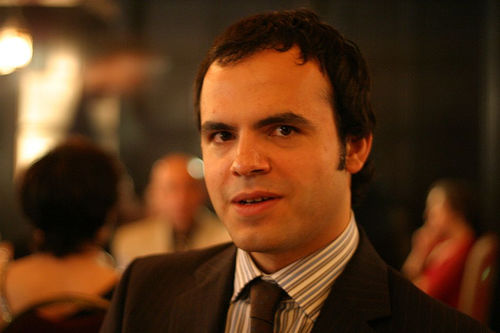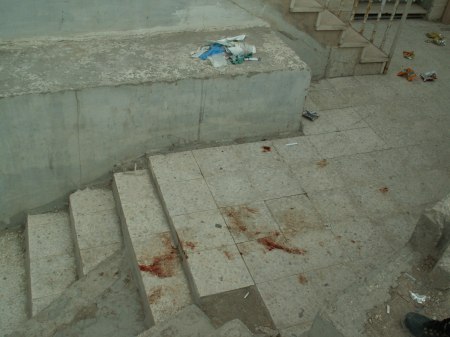 . Fallujah after the American onslaught of 2004
. Fallujah after the American onslaught of 2004.
One of the effects of the British American military campaign in Iraq in 2003 is the dramatic change in health standards and living conditions for the civilan population that last to this day. None however is as dramatic as the effects of the 2004 onslaught of the American marines on the city of Fallujah in 2004. And yet, although a recent epidemiological study shed some light on how very bad the situation really is, almost no media carreid reports about it.
Iraqi doctors in Fallujah have complained since 2005 of being overwhelmed by the number of babies with serious birth defects, ranging from a girl born with two heads to paralysis of the lower limbs. They said they were also seeing far more cancers than they did before the battle for Fallujah between US troops and insurgents.
Their claims have now been supported by this survey, which showed a four-fold increase in all cancers and a 12-fold increase in childhood cancer in under-14s. Infant mortality in the city is more than four times higher than in neighbouring Jordan and eight times
higher than in Kuwait. The study of 711 houses and 4,843 individuals carried out in January and February 2010 by authors Chris Busby and Malak Hamdan was called “Cancer, Infant Mortality and Birth Sex-Ratio in Fallujah, Iraq 2005–2009,” and was published in July in the International Journal of Environmental Studies and Public Health (IJERPH). It found also that that the forms of cancer in Fallujah are similar to those found among the Hiroshima and Nagasaki atomic bomb survivors, who in 1945 were exposed to intense fallout radiation.
In Fallujah the rate of leukemia is
38 times higher, the childhood cancer rate is 12 times higher, and breast cancer is 10 times more common than in populations in Egypt, Jordan, and Kuwait. Heightened levels of adult lymphoma and brain tumors were also reported. At 80 deaths out of every 1,000 births, the infant mortality rate in Fallujah is more than five times higher than in Egypt and Jordan, and eight times higher than in Kuwait.
Strikingly, after 2005 the proportion of girls born in Fallujah has increased sharply. In normal populations, 1,050 boys are born for every 1,000 girls. But among those born in Fallujah in the four years after the US assault, the ratio was reduced to 860 boys for every 1,000 female births. This alteration is similar to gender ratios found in Hiroshima after the US atomic attack of 1945.
The most likely reason for the change in the sex ratio, according to the researchers, is the impact of a major mutagenic event — likely the use of depleted uranium in US weapons. While boys have one X-chromosome, girls have a redundant X-chromosome and can therefore absorb the loss of one chromosome through genetic damage.
This is an extraordinary and alarming result,” said Busby, a professor of molecular biosciences at the University of Ulster and director of scientific research for Green Audit, an independent environmental research group. “To produce an effect like this, some very major mutagenic exposure must have occurred in 2004 when the attacks happened. We need urgently to find out what the agent was. Although many suspect uranium, we cannot be certain without further research and independent analysis of samples from the area.”
Busby told an Italian television news station, RAI 24, that the “extraordinary” increase in radiation-related maladies in Fallujah is higher than that found in the populations of Hiroshima and Nagasaki after the US atomic strikes of 1945. “My guess is that this was caused by depleted uranium,” he said. “They must be connected.”
US Marines first besieged and bombarded Fallujah, 30 miles west of Baghdad, in April 2004 after four employees of the American security company Blackwater were killed and their bodies burned. After an eight-month stand-off, the Marines stormed the city in November using artillery and aerial bombing against rebel positions. US forces later admitted that they had employed white phosphorus as well as other munitions.
In the assault US commanders largely treated Fallujah as a free-fire zone to try to reduce casualties among their own troops. British officers were appalled by the lack of concern for civilian casualties. "During preparatory operations in the November 2004 Fallujah clearance operation, on one night over 40 155mm artillery rounds were fired into a small sector of the city," recalled Brigadier Nigel Aylwin-Foster, a British commander serving with the American forces in Baghdad.
Dr Busby says that while he cannot identify the type of armaments used by the Marines, the extent of genetic damage suffered by inhabitants suggests the use of uranium in some form. He said: "My guess is that they used a new weapon against buildings to break through walls and kill those inside."
The US military uses depleted uranium, also known as spent nuclear fuel, in armor-piercing shells and bullets because it is twice as dense as lead. Once these shells hit their target, however, as much as 40 percent of the uranium is released in the form of tiny particles in the area of the explosion. It can remain there for years, easily entering the human bloodstream, where it lodges itself in lymph glands and attacks the DNA produced in the sperm and eggs of affected adults, causing, in turn, serious birth defects in the next generation.
The research is the first systematic scientific substantiation of a body of evidence showing a sharp increase in infant mortality, birth defects, and cancer in Fallujah.
In October of 2009, several Iraqi and British doctors wrote a letter to the United Nations demanding an inquiry into the proliferation of radiation-related sickness in the city:or:

“Young women in Fallujah in Iraq are terrified of having children because of the increasing number of babies born grotesquely deformed, with no heads, two heads, a single eye in their foreheads, scaly bodies or missing limbs. In addition, young children in Fallujah are now experiencing hideous cancers and leukemias.…
“In September 2009, Fallujah General Hospital had 170 newborn babies, 24 percent of whom were dead within the first seven days, a staggering 75 percent of the dead babies were classified as deformed.…
“Doctors in Fallujah have specifically pointed out that not only are they witnessing unprecedented numbers of birth defects, but premature births have also considerably increased after 2003. But what is more alarming is that doctors in Fallujah have said, ‘a significant number of babies that do survive begin to develop severe disabilities at a later stage.’
According to the authors of “Cancer, Infant Mortality and Birth Sex-Ratio in Fallujah,” the Iraqi authorities attempted to scuttle their survey. “[S]hortly after the questionnaire survey was completed, Iraqi TV reportedly broadcast that a questionnaire survey was being carried out by terrorists and that anyone who was answering or administering the questionnaire could be arrested,” the study reports.

In the attack, the US made heavy use of the chemical agent white phosphorus. Ostensibly used only for illuminating battlefields, white phosphorus causes terrible and often fatal wounds, burning its way through building material and clothing before eating away skin and then bone. The chemical was also used to suck the oxygen out of buildings where civilians were hiding.
The true number of city residents who were killed in the 2004 attack is not known. The city’s population before the attack was estimated to be between 425,000 and 600,000. The current population is believed to be between 250,000 and 300,000. Tens of thousands, mostly women and children, fled in advance of the attack. Half of the city’s building were destroyed, most of these reduced to rubble.Like much of Iraq, Fallujah remains in ruins. According to a recent report from IRIN, a project of the UN Office for the Coordination of Humanitarian Affairs, Fallujah still has no functioning sewage system six years after the attack. “Waste pours onto the streets and seeps into drinking water supplies,” the report notes. “Abdul-Sattar Kadhum Al-Nawaf, director of Fallujah general hospital, said the sewage problem had taken its toll on residents’ health. They were increasingly affected by diarrhea, tuberculosis, typhoid and other communicable diseases.”


.jpg)







 .
. 






















